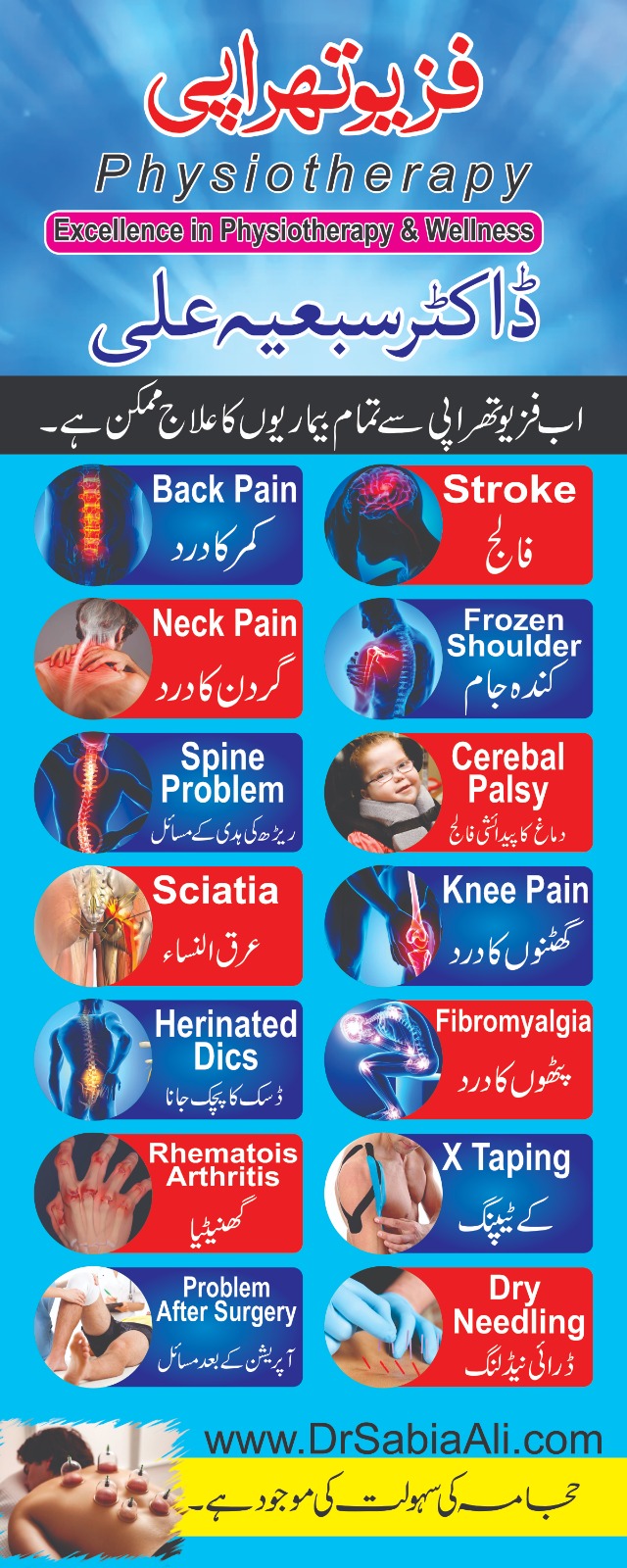Dr. Sabia Ali
I am a Senior Physio Consultant and Hijama expert with a deep commitment to holistic health and physical rehabilitation. As a proud member of the Pakistan Physical Therapy Association, I combine evidence-based physiotherapy with traditional healing techniques to help individuals regain strength, balance, and wellness in their lives.

About
Dr. Sabia Ali is a dedicated Senior Physiotherapy Consultant and Hijama Expert, committed to restoring health through evidence-based therapies and holistic healing. As a member of the Pakistan Physical Therapy Association, she offers personalized care, helping patients achieve long-term relief and wellness.

Dr. Sabia Ali
Senior Physio Consultant & Hijama Expert
Member
Pakistan Physical Therapy Association
I specialize in restoring movement and improving lives through physiotherapy, hijama therapy, and holistic wellness approaches. My practice is rooted in compassion, clinical precision, and a deep belief in the body’s ability to heal naturally when guided with the right care.
Physiotherapy
Helping patients recover from injury, reduce pain, and regain mobility through evidence-based therapeutic practices.
Hijama Therapy
Offering traditional wet cupping therapy to detoxify the body, improve circulation, and support overall wellness.
Holistic Health
Integrating lifestyle guidance, stress relief, and natural healing techniques to support full-body wellness and balance.
Services
Offering expert physiotherapy and authentic hijama services focused on pain relief, rehabilitation, detoxification, and holistic healing for both men and women.

FAQs
Necessitatibus eius consequatur ex aliquid fuga eum quidem sint consectetur velit
What conditions can physiotherapy help with?
Physiotherapy can help with back and neck pain, joint injuries, arthritis, posture issues, stroke recovery, sports injuries, and more.
Is physiotherapy painful?
No, physiotherapy is generally gentle. Some soreness may occur during recovery, but it's a sign of healing and progress.
How many sessions will I need?
This depends on your condition. Some patients feel relief in a few sessions, while chronic cases may require a longer plan.
Do I need a doctor’s referral for physiotherapy?
No, you can directly book an appointment. However, some insurance providers may require a referral.
What techniques are used during physiotherapy?
Manual therapy, therapeutic exercises, posture correction, dry needling, ultrasound therapy, and electrotherapy may be used.
Can physiotherapy help after surgery?
Yes. Post-operative physiotherapy is essential for restoring strength, mobility, and reducing complications.
Is physiotherapy suitable for all age groups?
Absolutely. From children with developmental delays to elderly patients with mobility issues, physio is beneficial across ages.
Can physiotherapy help with migraine or tension headaches?
Yes, physiotherapy can reduce tension in neck and shoulder muscles, improving posture and relieving headache triggers.
What should I wear to a physiotherapy session?
Wear loose, comfortable clothing that allows easy movement and gives access to the area being treated.
Can I do exercises at home in addition to therapy?
Yes. Your therapist may give you a customized home exercise plan to support your recovery.
What is Hijama therapy?
Hijama is a traditional wet cupping therapy that removes toxic blood and improves blood flow to promote healing.
Is Hijama painful?
No, the process involves mild suction and small surface scratches. Most patients report only slight discomfort.
What conditions can Hijama help with?
Hijama may help with migraines, fatigue, back pain, joint pain, infertility, skin conditions, and stress relief.
How often should I get Hijama done?
It depends on your health goals. Some patients benefit monthly, others seasonally or once every few months.
Are there any side effects of Hijama?
Minor redness or light bruising can occur but usually fades within a few days. Hijama is generally safe when done by professionals.
Who should avoid Hijama therapy?
Pregnant women, those with blood clotting disorders, or serious health conditions should consult before undergoing Hijama.
Is Hijama supported by modern research?
While rooted in traditional medicine, modern studies increasingly support its benefits for inflammation, pain, and detoxification.
Can I eat before a Hijama session?
It's recommended to fast 2–3 hours before the session for optimal results, but avoid coming on a completely empty stomach.
How long does a Hijama session take?
Typically between 30 to 45 minutes depending on the number of cupping points used.
What should I do after a Hijama session?
Rest, stay hydrated, avoid heavy meals and physical exertion for a few hours. Keep cupping sites clean and dry.
Contact
If you have any questions or would like to book a consultation, feel free to reach out anytime.
Contact Info
Email Address
Website
Working Hours
09:00 AM to 11:00 PM